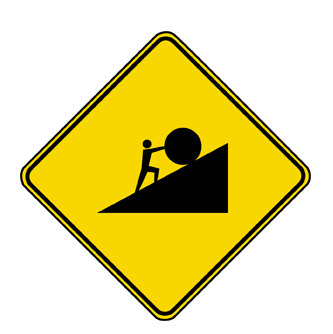Don't Be Absurd
By Peter LloydThe Big Bang gave us space. The story goes, everything was once packed in an extremely hot, tight, and dense situation. But today my chair is under me and my desk in front. The Bang also gave us time—the thing that keeps everything from happening all at once. Things appear to happen one after the other. I start writing and eventually, I finish. All seems to be in order. For a while at least.
 Like Sisyphus, the Greek king condemned eternally to roll a giant boulder up a hill and watch it roll back down, we spend much of our energy making and maintaining order. Change makes sure we stay busy. We create step-by-step procedures and instructions, social and political hierarchies, algorithms, contracts, and laws. Some of them work for a time, until change makes them absurd. Then we start all over again.
Like Sisyphus, the Greek king condemned eternally to roll a giant boulder up a hill and watch it roll back down, we spend much of our energy making and maintaining order. Change makes sure we stay busy. We create step-by-step procedures and instructions, social and political hierarchies, algorithms, contracts, and laws. Some of them work for a time, until change makes them absurd. Then we start all over again.Because change makes irrelevant so many of our attempts to create order, creative people thrive on chaos. Find the nonsense in a system, remove it, and you’ve got yourself an innovation. On the flip side, cling to order and you severely limit your creative power or cage your creative animal.
In Absurd rules make WSJ’s new leak site a non-starter, Paul Marks spotlights the absurdity of demanding copyright clearance for submissions to websites like Wikileaks, set up to for publishing leaked information. He focuses on Al Jazeera and the Wall Street Journal. Each demands that leakers have copyrights to the stuff they leak. In an even more absurd condition, the leaker must agree to forfeit all such rights to the publication. The WSJ demands, “a non-exclusive, transferable, worldwide, fully paid-up, royalty-free, perpetual, irrevocable right and license to use, distribute, publicly perform, display, reproduce, and create derivative works from, the Content in any and all media.”
Legal teams covering their butts? Yes, that and a ludicrous attempt to impose order rather than to address and correct challenges introduced by change. The incredible access to information we enjoy plus the unprecedented ability to make it available to the world, makes obsolete the old rules that have governed research and dissemination. In this case it makes them absurd.
 Old copyright law cannot deal with the avalanche of information, music, images, and creative work so instantly available and easily spreadable today. On my birthday in 2002, the Creative Commons began dealing with the situation. There’s a lot more work to be done, however, with copyright law and other nonsense. You might want to fix some of the absurdity that currently abounds.
Old copyright law cannot deal with the avalanche of information, music, images, and creative work so instantly available and easily spreadable today. On my birthday in 2002, the Creative Commons began dealing with the situation. There’s a lot more work to be done, however, with copyright law and other nonsense. You might want to fix some of the absurdity that currently abounds.For example, in an attempt to cover themselves from the Sisyphean task of keeping loose rocks from damaging the fine finishes of car bodies, some trucking companies slap, “Not responsible for objects thrown from truck,” on the backs of their vehicles. Not responsible? Who then? The signs, they must hope, will serve to discourage motorists from following too closely rather than to limit liability. I’m not fooled. Are you? This absurdity needs a fix.
I have to chuckle every time I notice the back side of the time-ticket I grab from the machine at a parking lot entrance. Most read something like, “By accepting this... you agree to the terms of this contract...” Contract? At the conclusion of most contracts I’ve signed, there’s something about entering freely into them. Unlike the terms you “agree” to when you launch a new software application. I suppose many of these feeble attempts to deal with the torrent of so-called contracts we enter into every day, fall under the heading of implied contracts. There’s got to be a better way.
 As I write, Mozilla, developer of the Firefox web browser, finds itself at odds with the Department of Homeland Security. The Feds don’t like the MafiaaFire add-on that helps users find sites they have censored. As if censorship has ever met success! See Mozilla resists request to remove Firefox tool.
As I write, Mozilla, developer of the Firefox web browser, finds itself at odds with the Department of Homeland Security. The Feds don’t like the MafiaaFire add-on that helps users find sites they have censored. As if censorship has ever met success! See Mozilla resists request to remove Firefox tool. Events will always outpace people’s ability to order them. And that’s great news for creatives. Every time innovation and invention alter the playing field, creative people find more and more opportunities to discard the old rules, start playing by new rules, and reap substantial advantages.
See also:
- The Illusion of Orderly Progress by Barbara Norfleet
Peter Lloyd is co-creator with Stephen Grossman of Animal Crackers, the breakthrough problem-solving tool designed to crack your toughest problems.
